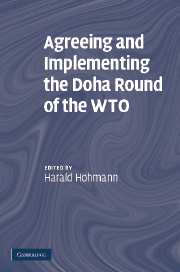Book contents
- Frontmatter
- Contents
- List of Contributors
- Foreword
- Introduction
- The future of the Doha Round
- PART ONE Development policy of the WTO
- 2 Developmental aspects of the Doha Round of negotiations
- 3a Aspects of development policy in the Doha Round – An EC perspective
- 3b An assessment of the Sixth WTO Hong Kong Ministerial Conference from a development perspective
- 4 Capacity building and combating poverty in the WTO
- 5 Integrating development and SDT (Special and Differential Treatment) into the architecture of the WTO – through the operation of its Dispute Settlement System
- PART TWO Trade policy (including competition) and trade facilitation
- PART THREE Reform of the dispute settlement system
- PART FOUR Social rights, health, and environment
- PART FIVE Conclusions
- Index
3a - Aspects of development policy in the Doha Round – An EC perspective
from PART ONE - Development policy of the WTO
Published online by Cambridge University Press: 23 February 2010
- Frontmatter
- Contents
- List of Contributors
- Foreword
- Introduction
- The future of the Doha Round
- PART ONE Development policy of the WTO
- 2 Developmental aspects of the Doha Round of negotiations
- 3a Aspects of development policy in the Doha Round – An EC perspective
- 3b An assessment of the Sixth WTO Hong Kong Ministerial Conference from a development perspective
- 4 Capacity building and combating poverty in the WTO
- 5 Integrating development and SDT (Special and Differential Treatment) into the architecture of the WTO – through the operation of its Dispute Settlement System
- PART TWO Trade policy (including competition) and trade facilitation
- PART THREE Reform of the dispute settlement system
- PART FOUR Social rights, health, and environment
- PART FIVE Conclusions
- Index
Summary
The contribution that trade can make to the integration of developing countries into the world economy has been widely recognised in recent years. In the WTO, Members have explicitly placed development at the heart of the multilateral trade system with the Doha Development Agenda (DDA) which aims at boosting economic growth across the whole developing world, including of course in Africa. It is a widely cited but striking fact that a 1% increase in Africa's share of global trade would deliver much more income every year than the continent currently receives in aid.
Therefore, the EU has from outset supported a global trade round that is genuinely pro-development. It is based on the belief that in the right circumstances, trade can help economic growth, which in turn can contribute to poverty reduction and development. Open economies tend to develop more than closed ones.
But a word of caution. First, the link between trade and development is not automatic, and not immediate. Good governance and regulatory reforms need to accompany trade liberalisation to ensure maximum output. Second, it is wrong to believe that there is a monolithic developing country situation. The WTO Ministerial Conference in Hong Kong and the Doha Development Agenda have shown significant differences in interests between developing countries – for example between the Least-Developed Countries (LDCs) and other small developing countries; between advanced developing economies such as Brazil or India and small and vulnerable economies (G–90 members); between preference seekers and MFN suppliers; between those developing countries that embrace multilateral rules in order to lock in place their domestic reforms, and those who remain resistant to rule making on grounds of sovereignty or even more misguided reasons.
- Type
- Chapter
- Information
- Agreeing and Implementing the Doha Round of the WTO , pp. 89 - 97Publisher: Cambridge University PressPrint publication year: 2008



